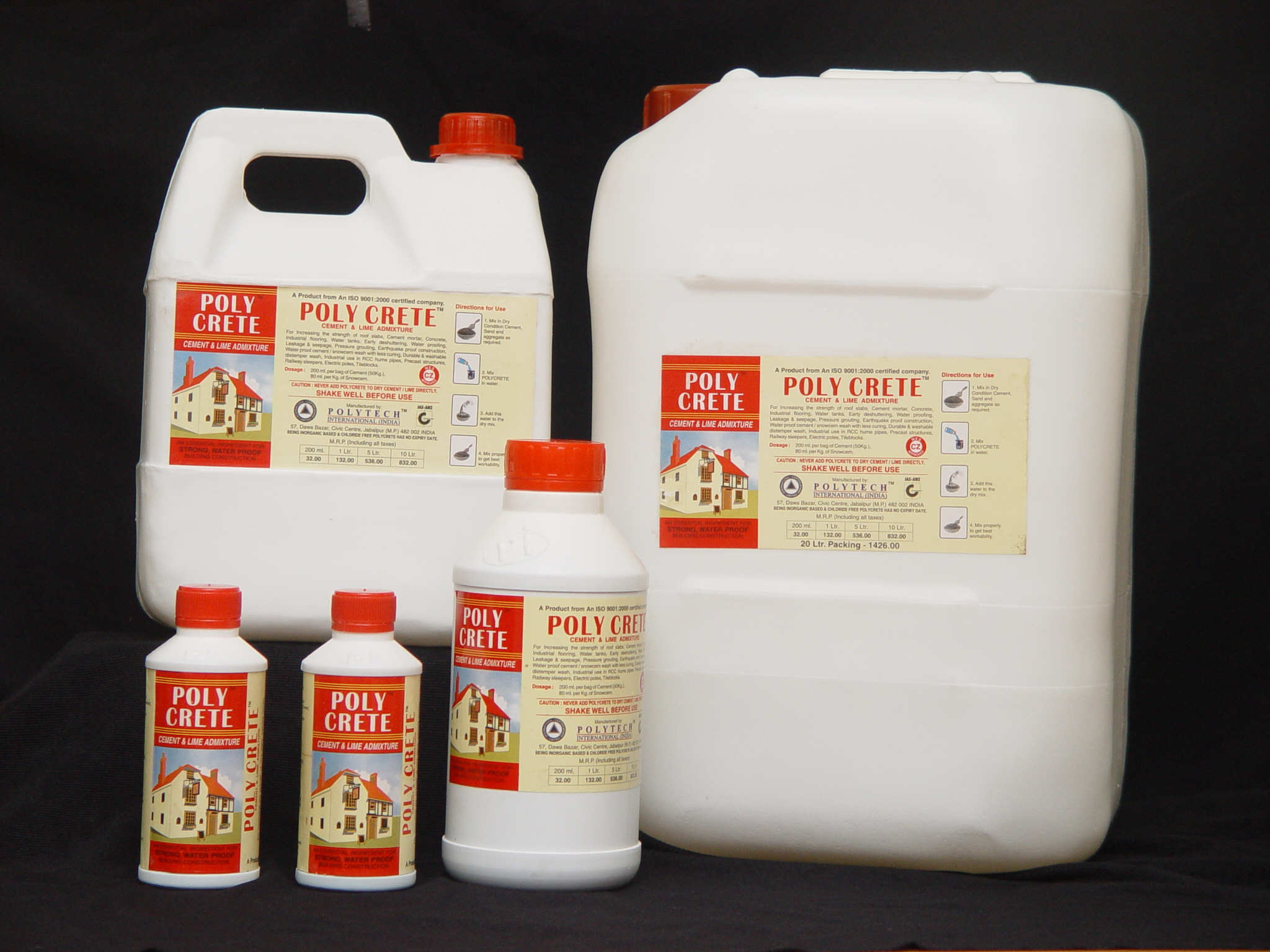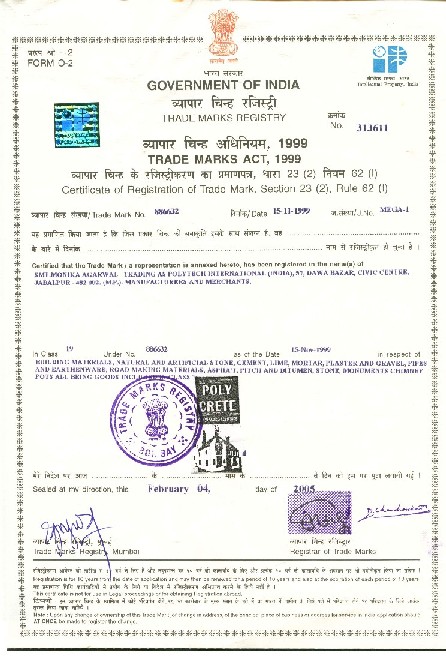|
| |
 View Trade Mark Registration Certificate
View Trade Mark Registration Certificate
Polycrete®
is available in packing of 200
ml, 1 Liters, 5 Liters and 20 Liters.
Polycrete®
is a complete cement admixture. It is totally chloride free, superb
plasticizing, water reducing, high early and final strength providing, excellent
waterproofing, strong reinforcement cement concrete bonding and corrosion
resistant agent.
-
Provides
high workability of cement concrete, retards the initial
setting time (till the compaction is done) for perfect working.
-
Makes
concrete and mortar remarkably cohesive and improves bonding strength. For the
same reason, it requires less curing.
-
Provides high
strength (up to twice the design strength has been obtained in independent
testing) at suitable dosages and makes up to 15% savings in quantity of cement
used possible.
-
Improves
coverage of plaster with classic finish. Provides excellent waterproofing
properties.
-
Makes
early removal of shuttering in R.C.C. roof slabs possible. With M-20 grade of
concrete, shuttering may be removed in slabs in just 4 days for spans up to 3
meters and 8 days in longer spans.
-
Converts
the high heat cement like 43 and 53 grades to low heat cement, deactivating
the high heat producing hydrolysis process, enabling them to be used under
tropical conditions also.
-
Provides
excellent resistance to sewage water, sea water, acid rains and salty
atmosphere of costal regions.
-
Provides
a corrosion resistant coating over reinforcement and makes strong bond between
the cement concrete and reinforcement making the R.C.C. structures remarkably
strong, highly tensile and extremely durable.
Top USES AND DOSAGES
1. For
laying totally waterproof slabs:
-
Use 0.5% solution of Polycrete for preparation of concrete for
laying slabs. This means using 200 ml of Polycrete per bag of cement dissolved
in necessary water.
-
Use cement
slurry treatment over the freshly laid and compacted roof surface. Use 1%
solution of Polycrete i.e. 100 ml in 10 liters of water for preparation
of cement slurry. Cement slurry treatment, if not done on the same day, should
necessarily be done on the second day of roof slab casting.
2. For
preparing white cement or wall finishing emulsions:
3.
For Injection / Pressure grouting:
4. For
making of waterproof basements:
-
Where water is coming from all sides at the site of basement,
make a drain 1 feet to 1½ feet deep on all the four sides with a sump 3' x 4'
x 4' to drain and pump out the water continuously to keep the surface of the
basement dry. If the surface of the basement is dry, flag stone may be laid.
If it is marshy, spread hard murram 3" thick duly compacted and then flag
stone may be laid. Use 1:6 or 1:8 cement-sand mortar with Polycrete 400
ml per bag of cement. Joints between the flag stones should be filled with 1:3
cement-sand mortar using 400 ml Polycrete per bag of cement.
-
For floors,
beams, columns and vertical walls cement concrete mix of 1:1½:3 with
M-20 grade mix using 400ml Polycrete per bag of cement should be used.
The floor thickness should be 5" to 6" and wall thickness 6" to 8". The outer
surface of the R.C.C. walls should be plastered using 1:4 cement-sand mortar
with 400 ml Polycrete per bag of cement. The plaster should be finished with
cement slurry.
-
While casting
concrete floor and walls, water should be continuously pumped out for at least
10 hours so that during the initial and final setting water level remains low.
Like wise, while plastering it is necessary to keep the water level low. If
the floor and walls are not cast in one day, then cement slurry treatment
using 1% Polycrete solution should be done at the joints of floor and walls.
-
On the floor and
inner surface of walls, plaster should be done with 1:4 cement-sand mortar
using 400 ml Polycrete per bag of cement.
4. Industrial
Uses:
-
Prestressed concrete elements used in electric poles, railway
sleepers, fencing poles, hume pipes where steam curing is adopted, half the
design strength is achieved within 4 hours. there are no cracks, no warping, no
breakage, and therefore, no rejection.
Thus use of
Polycrete results into high savings in inputs, enhances productivity and
improves profitability of the unit.
Top
THE CHEMISTRY OF POLYCRETE®
The
Chemistry of Cement:
The main
strength giving constituents of Portland Cement are Tri Calcium Silicate (3CaO.
SiO2) and Di Calcium Silicate (2 CaO. SiO2). Tri Calcium
Silicate (TCS) contributes towards early strength; on the other hand Di Calcium
Silicate (DCS) contributes towards later strength.
For setting
and strengthening of cement following processes are responsible :
(a)
Hydrolysis
(b)
Hydration I. Gel formation II. Hardening
(a)
Hydrolysis : When water is added to cement, hydrolysis of Calcium Silicate
take place. Calcium Silicate decompose into Calcium Silicates of lower basicity
and release Calcium Oxide which forms Calcium Hydroxide with water.
(i)
Hydrolysis of Tri Calcium Silicate -
Hydrolysis
3CaO. SiO2
+ H2O à
2CaO. SiO2 + Ca (OH)2
(When
water is less)
Hydrolysis
2(3CaO. SiO2)
+ 3H2O à
3CaO. 2SiO2 + 3Ca (OH)2
(When
water is more)
(ii)
Hydrolysis of Di Calcium Silicate -
Hydrolysis
2CaO. SiO2
+ H2O à
CaO. SiO2 + Ca (OH)2
(b)
Hydration : These silicates take up water molecules to form hydrated
silicate molecules in the process of non-reversible gel formation which then
change into metastable gel with simultaneous production of crystalline products
during the setting process of cement paste. Hardening of the set cement paste is
due to development of much stronger and irreversible intertwined crystalline
structure.
In normal
course of cement setting and hardening, cement actually loses strength as the
calcium silicates of higher basically decompose to lower basicity during the
process of hydrolysis and on hydration these lower basic calcium silicates form
hydrated calcium silicate crystals of lower molecular weights and therefore
acquire less strength during hardening process.
Features of Polycrete® :
-
In dilute
solution, Polycrete, as soon as comes in contact with Portland Cement, stops
the process of hydrolysis and does not allow the cement to lose its strength.
Gel activator activates the gel formation and with the help of high grade
plasticizer it forms a very cohesive and plastic mass of Portland Cement in
which the initial setting time is retarded for perfect working.
-
During
activated gel formation the whole mass accumulates high percentage of water
and hydration process is activated to acquire very high degree of hydration,
that's why hardening of the hydrated mass continues, even after stopping the
water curing, for at-least 72 hours, till all the accumulated moisture is
transformed and hardening process is complete to achieve final strength.
-
Polycrete
solution reacts with the reinforcement to produce a protective coating and
creates a strong bond between the reinforcement and cement concrete mass
thereby facilitating a high tensile strength in the R.C.C. structures.
-
Polycrete
contains high class stabilizers to make the cement concrete and mortar highly
resistant to atmospheric acidity as well as salinity and thereby makes them
much more durable.
-
In tropical
regions like India because of very high temperature fluctuations, low heat
cement is used for construction works in which Tri-Calcium Silicate must
be kept as low as possible, at about 30%. In higher grades of cement e.g. 43
grade and 53 grade the Tri Calcium Silicate content is kept at 43% and 53% to
achieve high early strength. Heat of hydrolysis and hydration in these cements
are very high and therefore these cements need very high degree of water
curing or otherwise cracks are resulted in the structures. Polycrete overcomes
this problem by stopping the process of hydrolysis and converting the high
heat evolving process to low heat process.
Top
CERTIFICATIONS
Polycrete has
been extensively tested independently. A summary of some results:
Tests for
Compressive Strength on 1:3 Cement Sand Concrete cubes made with 0.5%
Polycrete yielded following results: 7-day strength
- 234.66 kg/sq.cm. 7-day strength
(without curing) -
211.62 kg/sq.cm. 28-day strength
- 336.72 kd/sq.cm. These results
have been conveyed vide their letter no. 200032/Cor/NBM/390/E2 Plg dated 02
Nov. 1998. The Chief
Engineers of Jabalpur Zone and Lucknow Zone have approved the use of this
product for :
Tests for
Compressive Strength on 1: 2 : 4 Plain Cement Concrete cubes made with
0.5% Polycrete yielded following results: 7-day strength
(with curing) Sample 1
- 257.77 kg/sq.cm. Sample 2
- 311.11 kg/sq.cm. Sample 3
- 271.11 kg/sq.cm. These results
have been conveyed by Engineering Consultancy Services of Government
Polytechnic, Jabalpur vide their letter no. 95/CE/97-98 dated 24/06/1997.

Top
|
 Waterproofing, Antitermite and Clay Modification Products
Waterproofing, Antitermite and Clay Modification Products